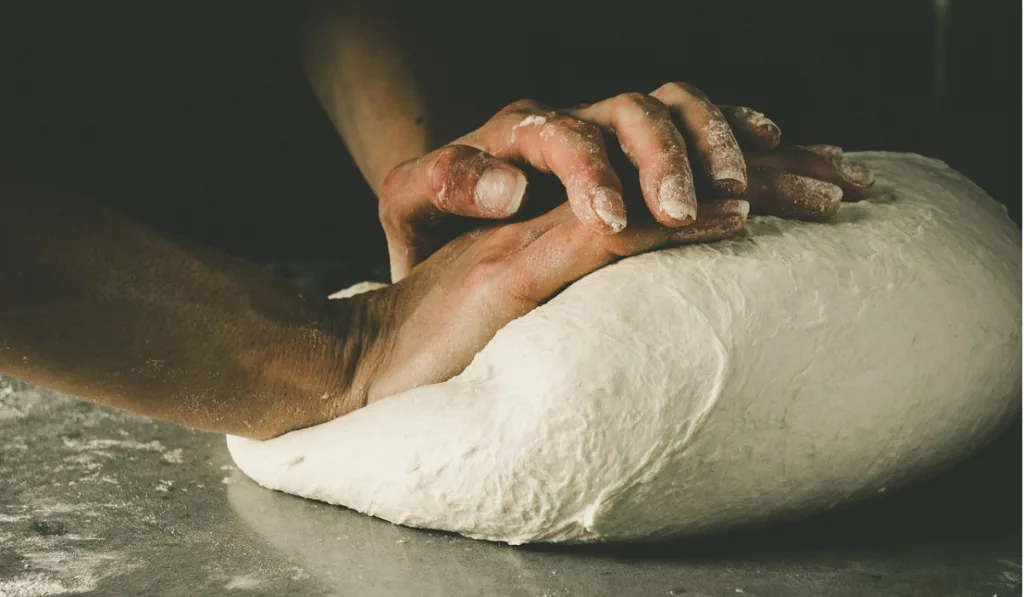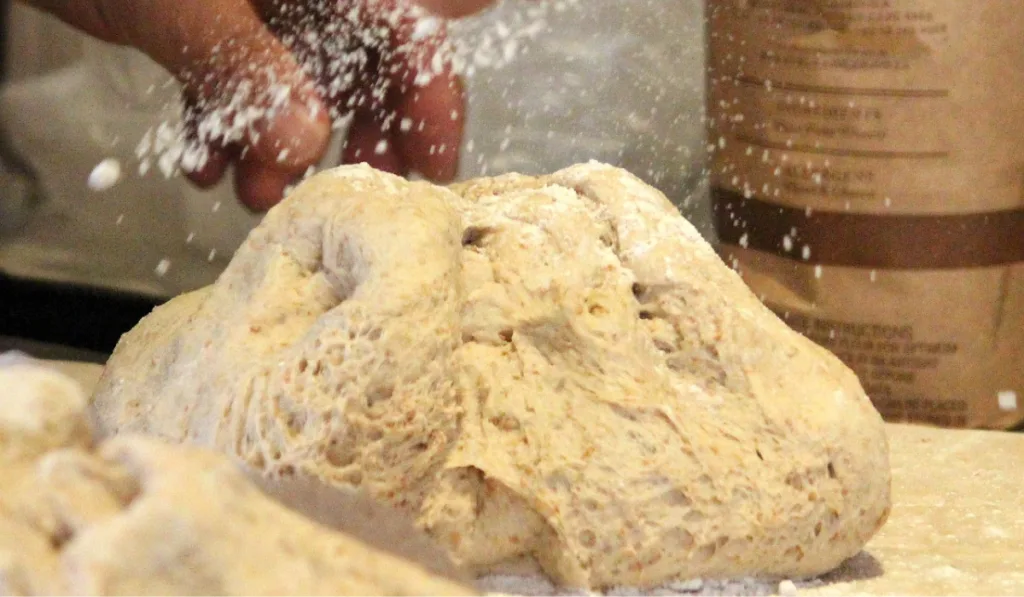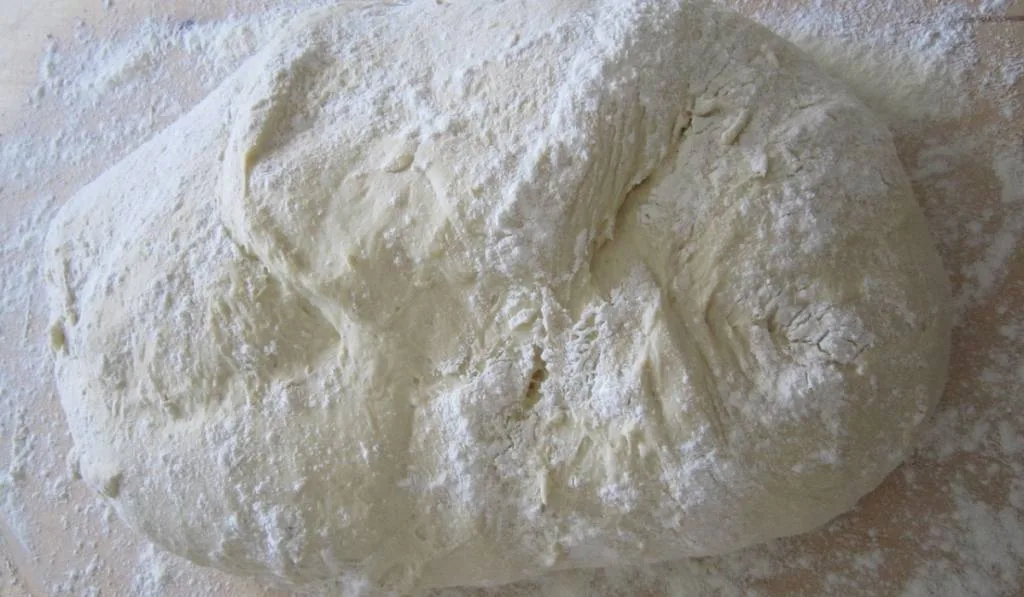
Sourdough’s unique flavor is influenced by the starter used and during the proofing stage, especially if you keep it in the refrigerator. The process of making your sourdough dough can take up to 3 days to complete. There are different times during this process that your dough can be refrigerated, and the length of time for proofing in the refrigerator is essential.
You can refrigerate your sourdough dough; this is usually done during the proofing stage. You can keep it can in the refrigerator for up to 16 to 24 hours, which is beneficial as it helps reduce the risk of over-proofing your dough. Cool temperatures will help form the sour flavors in the bread.
Keeping your sourdough dough at different temperatures during the fermentation process will release different acids, cultivating flavorful sourdough bread. Combining these different temperatures will help bring out different flavors during the process; it is good to know what temperatures will influence which flavors.
Should You Refrigerate Sourdough Dough?
Sourdough is a bread type that is slowly fermented. An essential ingredient is the sourdough starter made with live fermented culture and acts as a natural organic leavening agent instead of commercial yeasts. The starter is made from a mixture of wild yeasts and bacteria essential to producing the correct texture and flavor needed for sourdough bread.
This type of bread is well known for its chewy texture, crispy crust, and unique tangy flavor. It has health benefits due to its naturally occurring acids and extended fermentation which increases the breakdown of the gluten, making the bread more digestible and easier to absorb for the body.
Why Should Sourdough Dough Be Refrigerated?
How The Temperature Of The Dough Affects Its Flavor

The temperature of the environment that you let your dough rise impacts the richness of its flavor. During this rising stage, the sugars in your dough will be metabolized by the yeast producing carbon dioxide, alcohol, and other flavor compounds.
The temperature you let your dough proof at will affect the yeast’s speed and metabolic proficiency. Your dough’s ideal temperature for optimal fermentation is a room temperature of 80-90°F (27-32°C). It is good for most bread dough to ferment at this temperature, but it is not ideal for producing the rich flavor required for sourdough bread.
If yeast ferments at a warmer temperature, it will metabolize its sugars more efficiently with fewer by-products, such as lactic acid. Fermenting the yeast at a lower temperature will result in inefficient metabolism of the sugars slowing down and retarding the fermentation process. This will result in the production of more by-products, such as acetic acid, which improves the flavor of the sourdough.
When proofed at a warm temperature, the lactic acid produced will give the dough its sour taste. When acetic acid is produced at a cold temperature, it will give the dough a tangy flavor.
Note: Read more about the best temperature for proofing your sourdough in my article “Best Temperature for Proofing Sourdough: Full Guide & How To“
How Temperature Affects Its Size And Your Time
When you refrigerate your dough, it is easier to move to get it ready for baking; it will stay inflated, and it won’t reduce in size. The end product of the size of your bread will be much larger compared to bread that is proofed at room temperature.
When you ferment your dough at room temperature or a higher temperature, your dough’s window period for being ready will be very short, about 10 minutes or less. This brief window period will require you to keep a close eye on your dough so it does not over-proof.
Proofing your dough in the refrigerator will extend its window period. This extended period will give you more flexibility with your time, higher accuracy, and less chance of over-proofing your dough. Refrigerating the dough will give you more time to do other tasks without having to oversee it. Making sourdough bread can be very time-consuming; it can take up to 3 days to complete.
Note: Did you ever worry to overfeed a starter? If the answer is yes, you can check out my article “Can You Overfeed A Sourdough Starter”
When Should You Refrigerate Sourdough Dough?
You can refrigerate your sourdough dough during its bulk fermentation stage, also known as the rising or proofing stage. There are two proofing stages, the first rise of the dough and the second proofing, which happens after shaping it. It is important to remember to cover the dough with plastic wrap or a tea towel before proofing; otherwise, it can dry and crack if not covered.
You can proof your dough at different temperatures for each of the rising stages. It is possible to refrigerate your dough for one of the proofing stages and leave it at a warmer temperature for the other. Proofing the dough at both temperatures will produce the perfect tangy and sour flavor, improving the overall taste.
It is best to proof your dough at room temperature or a higher temperature for the first stage; this is done for 4-6 hours. It would be best if you proofed your dough in the refrigerator during the second rising stage. The dough should be placed at a cold temperature during the second fermentation period because it helps the dough hold its shape well, making it easier to work with.
What Is The Correct Temperature For The Dough?
When proofing your sourdough dough at room temperature during the first fermentation process, the ideal temperature is 75-82°F (24-28°C), resulting in a milder sourdough bread flavor. You can proof your dough at a higher temperature above 82°F (28°C), which will produce more of a sour flavor.
During the second fermentation stage, you can refrigerate your sourdough dough at an ideal temperature of 35-50°F (1.5-10°C), giving your bread more of a tangy flavor. Sourdough can ferment at a range of temperatures above freezing and below 110°F (43°C).
How Long Should You Refrigerate It For?
The temperature you decide to prove your dough at and the activity of the yeast used will directly affect the amount of time it should ferment. You cannot control the activity of the yeast, so instead, it is best to manipulate the speed that yeast metabolizes by controlling its temperature.
The amount of time you will need to prove your dough in the refrigerator is 16-24 hours or longer if desired. If you make it in the evening, you can leave it to prove overnight and bake it in the morning. The amount of time is influenced by different factors; it helps to know these to ensure it is proved for the right time. These factors include:
- The amount of starter used
- The flour used
- Different recipes
- The temperature of ingredients used.
Physical Changes In The Dough Indicating The Time For Proofing

The length of time your dough will need can be seen in the recipe you are using. It is best to look at the physical changes the dough experiences during bulk fermentation to ensure the time needed is correct. Here is what to look for:
- The size of the dough will increase
- The size increases due to air bubbles. Do not pop the bubbles; this will make the sourdough loaf denser.
- Wiggle the container holding the dough gently; if it bounces, then it is ready.
- Poke the dough; if it quickly springs back, then it is not ready yet. If it doesn’t bounce back, then it has been proofed too long. It is ready when it slowly bounces back, leaving a slight indentation in the dough.
- It will have a smooth, domed surface with air bubbles forming.
Note: If you want more detailed tips about how to see that your sourdough has finished proofing, read my article “4 Signs Your Sourdough has Finished Proofing“
How Does The Type Of Flour Affect The Time For Fermentation?
The type of flour you decide to use will affect the amount of time needed for proofing. If other flours besides white bread flour are used, the fermentation time will be affected due to different reasons. These flours include:
- Rye flour has high enzyme activity, which quickens the fermentation process.
- Whole grain flour is rich in fiber and bran. This provides food for the yeast, accelerating the fermentation process.
- Freshly milled flour ferments very quickly.
The flours above will result in a shorter time you will need to proof your dough; refrigerating these doughs is vital to extend the time. It would be best for you to use a recipe when using any of these flours to get the best results.
Conclusion
Sourdough may take longer to make, but in the end, it is rewarding and delicious. When using different ingredients such as flour, it is best to use a recipe to guide you.
It is good to plan one’s time well when making the dough to ensure it has the correct amount of time for proofing. If it is proofed for too long, you may end up with a very dense bread.
The sourdough dough can be proofed at different temperatures, which has an impact on its taste. This is good to note if you are very particular about the flavor of your bread. It is also essential to know what temperatures your ingredients need to be stored at before baking.

Hi, ich bin Aysha
Ich liebe es, nützliche Inhalte zu erstellen, damit du lernen kannst bessern Sauerteig herzustellen.
Wenn dir meine Inhalte gefallen, ziehe bitte in Erwägung, mir hier ein kleines Trinkgeld als “Dankeschön” zu hinterlassen. Ich schätze deine Freundlichkeit und Unterstützung sehr 🙂
Join Us and Transform >
Don’t Be an Amateur! Master the Art of Sourdough Bread!




Aysha, your insights on how flour types affect sourdough fermentation time are spot on! I can’t help but wonder, have you tested the ’00’ Italian flour? Would the protein content in it make a significant difference?
I’ve found in my own baking that hydration levels also play a role in fermentation time. It might be a good angle to explore in a future post.
Also, I recall a time when I used rye flour and the dough fermented quicker than expected! Maybe the enzymes in rye flour have something to do with it?
Thanks for sparking such a delicious discussion. Looking forward to your thoughts on my experience and questions! 🍞👩🍳